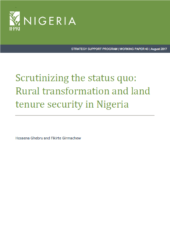
Despite growing consensus on the socio-economic benefits emanating from enhanced land tenure security, issues related to how best to measure it and what constitute universal indicators of tenure (in)security are poorly understood. As a result, issues of what drives tenure security are poorly understood and inconclusive. This study, thus, examines the drivers of perceived tenure insecurity in Nigeria using the Nigeria LSMS-Panel General Household Survey of 2012/13. The determinants of perceive tenure insecurity are assessed across two indicators: private (idiosyncratic) tenure risk and collective (covariate) tenure security risk.
The analysis shows that perceived risks of private land dispute are higher for female-headed households, households with lower social/political connectedness, and for land parcels acquired via the traditional/customary system, in contrast to having been purchased. Private tenure risk/insecurity is also higher in communities with vibrant land market and for households that are located close to urban centers, while the opposite is the case in communities with relative ease of land access. On the other hand, collective tenure risk is lower in communities with improved economic status.
Finally, signifying the need to account for intra-household dimensions in implementing land reform interventions, results from a more disaggregated analysis show that tenure security is relatively higher on female-managed plots of female-headed households, while the opposite is the case for female-managed plots of male-headed households.

Rejoignez-nous sur
LinkedIn X Facebook